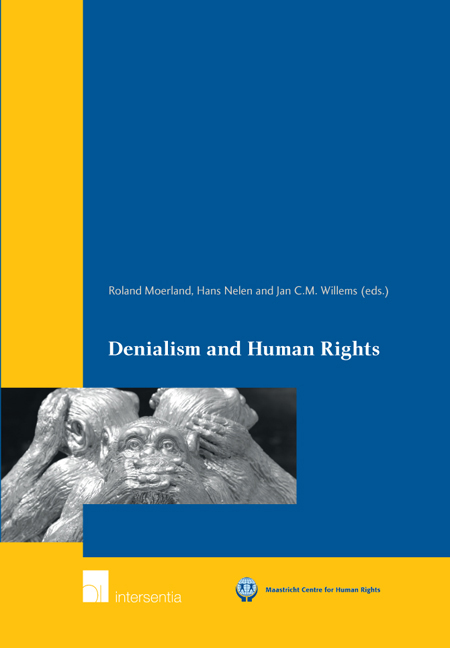Book contents
- Frontmatter
- Contents
- Acknowledgements
- Chapter I Introduction
- Chapter II Denialism and the Problem of Indifference
- Chapter III Denial and Acknowledgment in Public Responses to Information about Human Rights Violations
- PART I CHILDREN'S RIGHTS
- PART II GENOCIDE
- Chapter VIII The BBC Documentary ‘Rwanda's Untold Story’: Acknowledging Genocide or Denying It?
- Chapter IX Fighting NS Ideology and Holocaust Denial in Austria: Past and Present Perspectives
- Chapter X The Holocaust and its Denial: A Paradigm in our Historical Culture
- Chapter XI Can the Law Understand the Harm of Genocide Denial?
- Chapter XII On the Breaking of Consensus: The Perinçek Case, the Armenian Genocide and International Criminal Law
- PART III (INTER)NATIONAL ORGANISATIONS
- PART IV NEW PENOLOGY
- PART V SOCIAL, ECONOMIC AND CULTURAL RIGHTS
- About the Authors
- Maastricht Series in Human Rights
Chapter XII - On the Breaking of Consensus: The Perinçek Case, the Armenian Genocide and International Criminal Law
from PART II - GENOCIDE
Published online by Cambridge University Press: 19 September 2018
- Frontmatter
- Contents
- Acknowledgements
- Chapter I Introduction
- Chapter II Denialism and the Problem of Indifference
- Chapter III Denial and Acknowledgment in Public Responses to Information about Human Rights Violations
- PART I CHILDREN'S RIGHTS
- PART II GENOCIDE
- Chapter VIII The BBC Documentary ‘Rwanda's Untold Story’: Acknowledging Genocide or Denying It?
- Chapter IX Fighting NS Ideology and Holocaust Denial in Austria: Past and Present Perspectives
- Chapter X The Holocaust and its Denial: A Paradigm in our Historical Culture
- Chapter XI Can the Law Understand the Harm of Genocide Denial?
- Chapter XII On the Breaking of Consensus: The Perinçek Case, the Armenian Genocide and International Criminal Law
- PART III (INTER)NATIONAL ORGANISATIONS
- PART IV NEW PENOLOGY
- PART V SOCIAL, ECONOMIC AND CULTURAL RIGHTS
- About the Authors
- Maastricht Series in Human Rights
Summary
The 100th anniversary of the Armenian genocide is also the year of the revision by the Grand Chamber of the Doğu Perinçek v. Switzerland judgment rendered by the European Court of Human Rights (ECtHR) on 17 December 2013. We will focus here on one of the arguments set forth by the ECtHR in 2013, which disfavours the Swiss criminal jurisdictions in this case of genocide denial: the problematic argument of the absence of a ‘general consensus’ on the 1915 genocide. This contribution aims to shed light on the paradoxes and consequences of such an argument that calls, notably, for a historical perspective – and demands, in particular, that we look back on the history of international criminal law.
‘[T]hey will persist. And you won't yet have come to their real plan: they do not, in spite of what they say, intend to make history, but rather modify irreversibly what happens when a community consents.’
The year which marks the centenary of the Armenian genocide is also the year which sees a legal challenge against the ruling of 17 December 2013 by the ECtHR in the case of Doğu Perinçek v. Switzerland. In this ruling, the Court (by five votes to two) found Switzerland guilty of having violated the applicant's freedom of expression guaranteed by Article 10 ECHR. The holder of a law doctorate who ‘considers himself as an historian and writer’, Perinçek is the Chairman of the Turkish Workers’ Party (recently renamed ‘Homeland Party’ – Vatan Partisi) and the founder of the Talaat Pasha Committee, the aim of which is to rehabilitate and defend the memory of the principal instigator of the 1915 Armenian genocide – the ‘Ottoman Hitler’.
Among the various arguments presented by the ECtHR in support of its overruling of the Swiss courts in this genocide denial case, one stands out as deserving particular attention here. According to the Court, the denial expressed by Doğu Perinçek when he described the Armenian genocide specifically as an ‘international imperialist lie’ poses no problem from the point of view of human rights, as it supposedly only denies the legal characterisation of the genocide (rather than the facts themselves): a characterisation which, in this particular case, is apparently not the subject of ‘general consensus’.
- Type
- Chapter
- Information
- Denialism and Human Rights , pp. 235 - 250Publisher: IntersentiaPrint publication year: 2016
- 4
- Cited by



